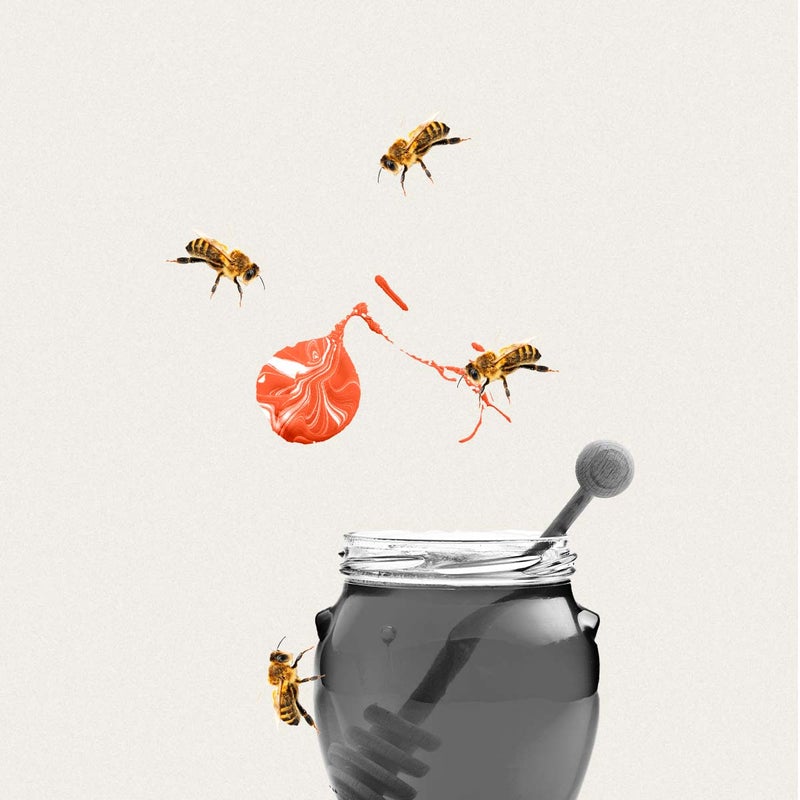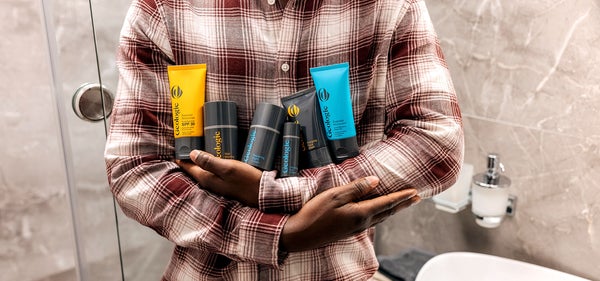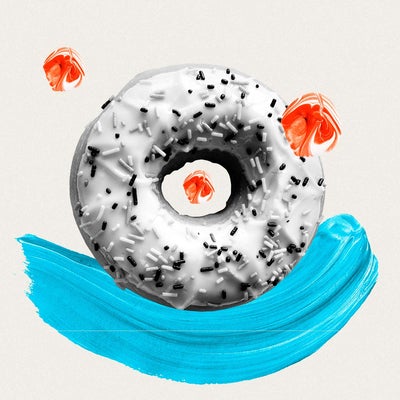
Your Greasy Nose, Explained.
In this article, you'll learn:
1. Why the nose is the greasiest part of your body
2. How to get rid of "greasy nose" syndrome
3. If a honey mask is a good idea for oily skin
4. Why you shouldn't believe any skincare brand that claims your pores are shrinkable
5. Why some guys get oily skin in the afternoon.
6. Whether oatmeal is good for your oily skin
7. The meaning of mattifying
8. How niacinamide reduces shine on the oily face
9. The answer to: "When I squeeze my nose pores, white stuff comes out. What's the deal?"
10. That oil on your nose can start a fire — for real.
Are you an oily skin type and wondering why? Here's some basics: your T-Zone -- forehead, nose, cheeks and chin — has more sebaceous glands than anywhere else on your body, which means the "T" signifies Trouble.
But despair not. We consulted Dr. Steve, our founding dermatologist, and we've collected a treatise on oily skin and greasy noses, 12 facts about sebum that might surprise you, amaze you, and even disgust you. (Hint: Dr. Steve answers the often-asked question: "When I squeeze my nose pores, white stuff comes out. Why?"

Why is my nose so greasy, while the rest of my face is dry?
Dr. Steve: The nose is unique because a lot of sebaceous glands are located there, and they’re larger in size than anywhere else. So that's an area that can be very troublesome.
If you have oily skin, your nose may produce considerably more oil because your pores are naturally larger than other pores on the face.
It's also an area where rosacea happens a lot. Here's a blog article that explains in great detail why guys are so prone to oily skin.
How do I get rid of oily pores on my nose?
Dr. Steve: First thing, the size of your pores is a genetic thing, and it’s not really possible to shrink pore size. They can be dilated and constricted for a very brief period of time with alcohols and topicals that dry the skin, but as a durable effect pores cannot be made smaller.
When I say this to my patients, they say “Then can I get tighter pores?” A lot of times what tighter pores means is actually just cleaning out your pores. When you have dark junk in the pores, the pores are quite visible. What can’t be made smaller can however be made less noticeable, and you do this by cleaning them out.
Use retinol to control the oil and salicylic acid to exfoliate — they’ll literally clean out the pores. They’ll soon become less visible, because the coloration of the pores will more closely match the coloration of the skin.
You can find both products in the Essential Acne set.
I’ve been told that a honey mask can help with my oily skin. True?
Dr. Steve: Not really. Honey has antibacterial and antiseptic properties — it’s embedded in band aids — but it also has wildly different characteristics. It’s a very complex viscous fluid, with different origins. It’s kind of a fad thing. If you like it and it makes you feel good, it's unlikely to really hurt you. But it's also messy and sticky, traits that make it completely infeasible to use on a daily basis.
To me, when it comes to efficacy for acne, go with salicylic acid and retinol. They have way better evidence, performance and the outputs that you want than honey does. Think about what you can use consistently, effectively, and daily. That’s what we’ve made for you at Geologie.
Check out the Essential Acne set.
Some guys get oily in the afternoon. Why is that happening?
Dr. Steve: It all begins in the morning when you wake up. When you're sleeping, the temperatures are cooler, you’re less physically active, everything's shut down — including oil production.
When you wake up, you get a blood sugar spike and everything, including oil production, kicks into motion.
Typically if you haven't washed your face in the morning, or you haven't showered, that oil production will continue and accumulate throughout the day. On the other hand, guys who wash their face too frequently will also be more oily, because they’re stripping away layers of moisture and drying out their skin; when your skin is dry your glands compensate by producing more oil.
And it also depends on other things, like stress and your environment as well. So if you're sweating more, or stressing, that can increase oil production in the later afternoon.
Salicylic acid is a great exfoliator, and you can find it in the face wash.
I’ve been reading that I should try oatmeal for my oily skin because it’s an oil absorbing ingredient.
Dr. Steve: Keep in mind that oatmeal is a big part of moisturizer — Aveeno is famous for using colloidal oatmeal, a kind of mashup of oatmeal into a paste. Oatmeal itself has lipids, fats, and moisturizing elements. So it really isn't an oil-absorbing agent, it’s a moisturizing agent.

Is it true that oily skin doesn’t need moisturizer?
Dr. Steve: Wrong. It’s easy to mistake oily skin for hydrated skin, but here’s the difference: Skin oil is the waxy substance (sebum) secreted by the sebaceous glands to coat, protect and lubricate your skin. Skin hydration is the term used when water is absorbed into the layers of the skin to maintain its elasticity and resiliency.
Hydration makes our skin feel soft, but it won't stay soft without oil to protect that hydration from escaping. And when the oils are depleted — due to any number of reasons, as detailed in this blog post about dry skin — the result is dry skin. When your skin is dry, your glands compensate by producing more oil. So keeping your skin hydrated can also fight excess sebum production.
I’ve been reading other skincare blogs and they say that retinol can help shrink pores, reducing your nose’s overall oil production. True?
Dr. Steve: No. Retinol definitely affects oil production, that's why there's a dryness when you initially use retinoids. It definitely affects keratinization — the issue around acne formation. They break up comedones, which makes pores more obvious to see, but they don't affect the actual pore size. That’s what God gave you.
I’ve heard that people with oily skin don’t get wrinkles. True?
Dr. Steve: Not true!
People with excess natural oils will get different kinds of wrinkles, but they’ll still get wrinkles. Oily skin types tend to have thicker skin, which means they’re more likely to age with deeper lines.
If you’ve got thin, dry skin, you’re more likely to get fine lines and crinkly facial wrinkles.
Either dry skin or oily skin, everybody needs to moisturize, try the morning cream with hyaluronic acid.
I have oily skin and I’ve been told I need something that’s mattifying.
Dr. Steve: Mattifying is a broad term. It’s used to describe something that soaks up oil, and it also means something that’s anti-oil. For example, hyaluronic acid is considered a mattifying agent by some experts because as a moisturizer it’s very hydrophilic, but it’s unique in that it doesn't have an oily, heavy feel to it, so it won’t worsen oily skin.
Niacinamide can even be considered mattifying because it helps regulate oil production. Same with retinol, which is an acne-slayer that also regulates oil production. Salicylic acid would be considered a mattifying agent because it's an exfoliant that’s helpful for oiliness, as well as glycolic acid.
But if you were to ask me what is a true mattifying agent, I would say Dimethicone, which is designed specifically to absorb oil. We use Dimethicone as one of the main ingredients in all of our moisturizers — and all of our AM creams have silica, another mattifying agent.
Does niacinamide reduce shine on the face? Some studies say yes.
Dr. Steve: It does definitely modulate sebum production, so it's probably decreasing the shine because of that, but not because it's magically absorbing oil. I love niacinamide, here's why I included it in both the morning cream and the repairing night cream.
When I squeeze my nose pores, white stuff comes out. What’s the deal?
Dr. Steve: That’s sebum. People with large pores on their nose who produce excess sebum will often squeeze it out. I don’t recommend it because you can do damage to the skin if you do it overzealously. It’s the same reason why you should not pop your zits.
Is it true that your nose oil can start a fire?
Dr. Steve: It’s true. Sebum consists of triglycerides, free fatty acids, wax esters, and squalene. All of these are flammable-wax esters — what wax candles are made of.
Sick of the slick? Salicylic acid in the every day facewash can help with that. Try the diagnostic and let's figure out how we can help. It's time to take control of the oily skin.










